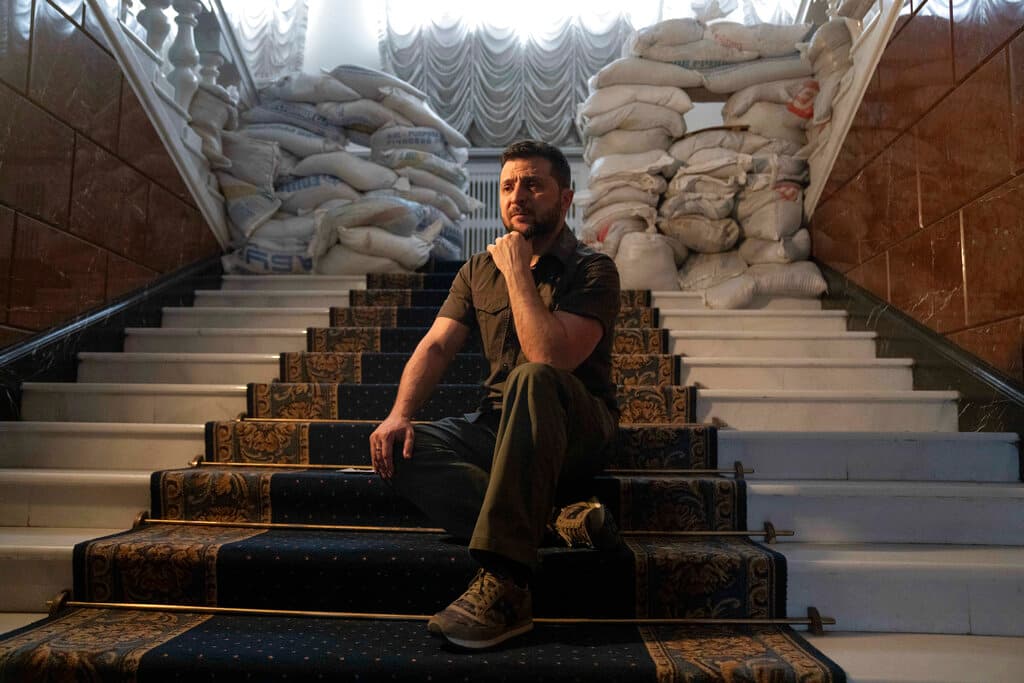The Outline of a Solution to the War Is Starting To Become Apparent in Ukraine
The time has come to give Ukraine the tools for victory.

President Zelensky’s message to the United Nations was commendably forthright and relevant to the United States and NATO. He effectively accused the world and the Western Alliance of cowardice.
It is easy to discount this as an overstatement of a man driven to highly emotional comments under the terrible stress of leading a nation fighting for its life against a powerful and ruthless invader.
And especially in America where the airwaves and comment columns are still cluttered with utter nonsense decrying the bogeyman of those who have a secret ambition to plunge America into another endless ground war (there are no such people), the Ukrainian leader’s remarks may seem inappropriate.
He was specifically asked in a subsequent interview if he was not being “undiplomatic” and responded that as his country had suffered an unprovoked attack and many of its urban centers had been mercilessly pounded from the air and by heavy artillery and 10 million people, nearly a quarter of the entire population (the equivalent of 80 million Americans), had been driven from their homes in a completely unprovoked war, it did not seem to him and his countrymen to be a time for diplomacy.
President Putin stated at the beginning of his assault on Ukraine in late February that Russia intended to eliminate Ukraine as an independent country; that it had no historical standing, no legitimacy, and no right to exist as a sovereign country.
Russia promised in 1994 along with America and other countries that it would respect and defend Ukraine’s borders in consideration for Ukraine (and Belarus and Kazakhstan) voluntarily giving up the nuclear weapons that they had inherited from the Soviet Union.
Although the Pentagon and the CIA were well aware that Ukraine was, partly thanks to the President Trump, awash in anti-tank and anti-helicopter weapons and had a highly trained and well-equipped army of 300,000 and reasonably well trained reservists of more than an additional 200,000, the ineffable chairman of the Joint Chiefs of Staff General Mark Milley, burdened with herniating masses of decorations, assumed that the whole operation would be a virtual march-past by the Russian army and that the Russians would occupy the capital, Kyiv, within a few days.
President Biden, with his perfect sense of occasion, timing, and the appropriate gesture, le mot juste, offered the Ukrainian leader and his family a safe passage when they would choose to flee their country.
There has always been ambiguity over American and NATO war aims. Because the United States is using the so-called good offices of Russia in renegotiating the infamous Iran nuclear agreement (rather than its co-signatory allies, Britain, France, and Germany), it has always been difficult to take the Biden administration’s strictures addressed to the Kremlin seriously, such as Mr. Biden’s blurted accusation that Mr. Putin was a “war criminal.”
The most distressingly amateurish illustration of the ambivalence of the American Ukraine war position was several weeks ago when Secretary of State Blinken said in Warsaw that he approved the delivery of Polish warplanes to Ukraine and three days later the bumbling Pentagon spokesman, John Kirby, expressed administration disapproval of this plan as “escalatory.”
Given the Russian aerial and artillery bombardment of civilian areas in Ukraine and other “war crimes,” this was absurd. The only escalation would be in assisting Ukraine to defend itself, a declared U.S. objective. (One might wonder about the fate of a Pentagon spokesman contradicting more prepossessing secretaries of state than the incumbent, such as Henry Kissinger, George Shultz, James Baker, and Colin Powell.)
For weeks President Biden recited tedious pieties about defending “every square inch of NATO territory,” though none of it was under threat, and of working hard to raise international outrage at Russia’s conduct, as if this counted for anything in terms of potential influence on the Kremlin.
It has taken an unconscionable length of time to give Ukraine serious defenses against the Russian Air Force at altitudes above 10,000 feet, though it is finally happening. All of this illustrates the inexcusable and agonizing inability of NATO and the United States to develop a coherent war strategy. They have wished to help Ukraine without offending Russia militarily, even while savaging Russia verbally.
The national security advisor, Jake Sullivan, speaking on television on Sunday, shed a little light on America’s purposes by saying that it was trying to bring about productive negotiations. This implies a recognition of the fact which dare not speak its name, especially in the presence of President Zelensky, that approximately nine million Ukrainians in the Crimea and eastern Ukraine are Russian-speaking and might probably prefer to be Russians rather than Ukrainians.
Mr. Zelensky speaks defiantly of not sacrificing any territory. There’s no need to contradict him publicly, but if the ethnically Russian areas wish to be in Russia, that is their right. Yet Russia has absolutely no legal or geopolitical right to be trying to suppress Ukraine altogether, much less of violating international conventions with brutal attacks upon the civil population.
The appropriate stance for the United States and NATO is to pursue the objective Mr. Sullivan stated, by arming Ukraine to the teeth to protect its own territory and airspace and force Russia to negotiate seriously.
It would be a small but gratefully received mercy for right-wing commentators in the United States to stop implying that Washington is teeming with warmongers seeking to exchange fire with Russia, and for the administration’s apologists to end the pretense that protecting NATO territory has anything to do with the issue of Ukraine’s right to exist as a country.
The basis of peace must be the expansion of Russia to include those Ukrainians who would rather be in Russia in exchange for Russian acceptance that the balance of Ukraine is a sovereign country, and deferral of Ukraine’s ambition to join NATO in exchange for an ironclad guaranty of its revised borders by Russia and NATO (a NATO that in a clear series of defeats for Russia, will soon include Finland and Sweden, as well as a Germany that has finally determined to arm itself appropriately).
General Milley, who six weeks ago predicted the end of the Ukraine war in Russian triumph within one week, said last week that it could go on for years; at least he is consistent in the fatuity of his predictions.
This war can be ended quite quickly if the United States and NATO make it clear that they will provide Ukraine with what it needs to repulse the Russian invasion and if they apply steadily more serious methods of economic persuasion on Russia to negotiate a peace of Ukrainian sovereignty but self-determination for those heavily Russian sections of eastern Ukraine.
If they wish to be Russian they have that right. If they do not wish to join Russia, Russia must stop interfering in their affairs. Russia has some legitimate claims, even though it is pursuing them in a totally illegal and barbarous manner. Ukraine has established the political reality of its existence and determination to survive as a sovereign country.
The outline of a solution is clear, and Jake Sullivan hinted at it. He and Messrs. Biden, Milley, and Blinken and the Pentagon and NATO should concert on the same song sheet and stick to it. To borrow, as is now fashionable, from Mr. Churchill, “Give them [Ukraine] the tools and they will finish the job.”

